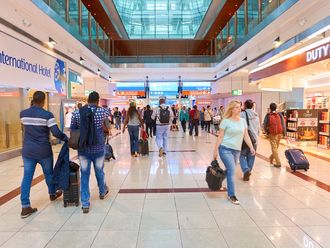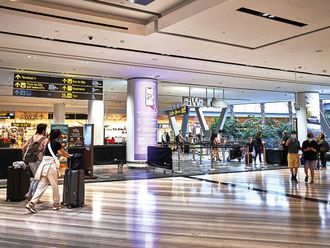
The travel industry is united in subscribing to a GCC visa, allowing tourists to hop countries in the region. However, they still have to convince the respective leaderships that Schengen-like visas are a realistic proposition.
"A common GCC visit visa could be beneficial for hotels, airlines etc. But they should do it only for tourist-led countries in the region. Saudi Arabia won't do it, for a myriad of reasons," said Daniel Hajar, the chief executive officer of Layia Hospitality.
For Saudi Arabia there is no urgency in the matter, as highlighted during the recent Arabian Hotel Investment Conference by Dr Salah Al Bukhayet, the vice-president of investment at the Saudi Commission for Tourism and Antiquities.
The country is still pushing for its own population to stay in the country on their holidays rather than to draw in visitors.
"We'll focus on the domestic market until the quality and quantity of our offering is at an acceptable level, only then [will we] invite international tourists," Dr Al Bukhayet said.
The Qatari controversy
Then the news that Qatar was planning to revoke visas on arrival, currently granted to 33 nationalities, on May 1 had industry insiders wondering how viable a common visa could be.
"Some countries within the GCC would greet the opportunity to move into that direction. It would be ideal, but how after Qatar nearly changed the visa waiver regulations recently?" said Samir Hammadi, director of sales and marketing at Alpha Tours in Dubai.
Qatar has since backtracked on its plan.
According to the Embassy of Qatar in Washington, the government extended visas upon arrival until further notice on April 19.
A representative of the Qatar Tourism and Exhibition Authority refused to comment on the issue but stated that the country was in favour of a common visa and already had a reciprocal agreement with Oman.
A European travel agent, who requested anonymity, said that Qatar could have been justified to undertake the move as Brussels was dragging its feet on opening some of Europe's doors to Qatari nationals.
"It isn't easy and expensive to get a visa. Qatar may have backtracked on withdrawing the visa waiver for Europeans but they did have a valid point for a withdrawal," he said.
Natalia Ros, director of the tourism division of Blue Link in Dubai, reported a similar story.
"We deal with a lot of GCC tourism to Spain and unfortunately it can be a nightmare to obtain visas for Kuwaitis for example."
Kuwait is also one of the GCC countries where entry isn't simple. Some visitors need to go through several layers of approval, involving the CID.
"A GCC visa is a no-brainer, some countries though would like it [while] others wouldn't," said Helmut Meckelburg, CEO of Safir International Hotel Management.
"In Kuwait for example there is exposure to different interests — security would be an argument why it couldn't be done."
Majida Bahbahani, director of marketing and foreign relations for the tourism sector in Kuwait's Ministry of Commerce and Industry explained why security concerns were the main reason for countries holding back.
"Arab nationals can move freely in the GCC, and we're pushing for making it easier for other nationalities. But it's a security issue as each interior ministry in the Gulf has a different strategy, depending on which majority of expatriate nationals live in their country," Bahbahani said.
Common visa pros
It is common for countries throughout the world to have occasional reciprocal issues and concerns regarding security. They certainly complicate matters.
However, if one sets them aside for a moment one could see the value tourism adds to the region, reminds Hammadi.
"When the UAE granted a visa waiver to 33 nationals back in 2001 it had a major impact on the development of the tourism sector here.
"GCC countries have to understand that tourism can have a major influence. In the UAE alone it contributes to more than 20 per cent of its GDP," Bahbahani said.
As the tourism sector in the region evolves, GCC members are increasingly looking at pooling their resources together.
They offer packages that include more than one country, as recently pointed out by the Minister of Tourism of the Sultanate of Oman.
"We're complementing each other as we all have different products to offer, either as a twin or multiple destinations," said Dr Rajiha Abdul Amr Ali at the AHIC.
"It is more economical for tourists to travel this way and we've discussed this matter with airlines and other countries in the region."
Airlines opening ever more routes to increase access points for tourists are the first to admit that a common visa would make their lives easier.
"It would help airlines to be more flexible and save time," said Syed Azmathulla, district sales manager for Dubai and the northern emirates for Kuwait Airways.
Tour operators often in charge of organising visas for their clients could save themselves a lot of headaches and time.
They point out that Latin Americans, South East Asians and Chinese form part of a strong potential tourism flow to the Gulf.
"I believe one tourist visa for the GCC is under discussion. If it comes it would be excellent," said Madhu Pillai, assistant manager of cruises at the Sharjah branch of Orient Tours.
"We have in-bound Japanese tourist groups for example and they want to explore as many countries as possible in a short period."
The cruise advantage
A single visa would speed things up, especially in the cruise business. Ships use Dubai as the hub or satellite city to sail to Muscat, Bahrain, Doha and Kuwait — a five-nation tour.
Operators point out that they often carry a lot of Brazilian travellers, and they need to acquire several UAE entry visas as the ship leaves Dubai, goes to Fujairah, then Oman and comes back again.
"It was near impossible to apply for a visa again to return as there wasn't enough time. A huge improvement came along in 2006, whereby the UAE permitted to apply for three visas at the same time for cruise guests," said George Varghese, general manager — commercial, Rais Hassan Sa'adi Group, a port agent in Dubai.
Although possible, it still triples the entry cost. Jamal Sadiq represents Costa Cruises as well as the Omani Ministry of Tourism in Dubai. He pointed out that all the big cruise operators are facing problems as they may require five different visas for a six-day trip.
"It costs money and time to process these. And that affects the decision making of tourists, whether to come here or go to the Mediterranean where they can get just one Schengen visa," he added.
A home truth, Varghese said, would probably be discussed further within the Regional Council for Cruise Tourism, created at this months' first Seatrade Middle East Cruise Forum in Bahrain. The bilateral agreement between Qatar and Oman was mentioned at the forum as an example, although it does not allow travelling via any other GCC country, he added.
"In the long-term we would love to see one multiple entry visa for all countries involved in cruise tourism. Oman and Qatar signing a reciprocal agreement is already a huge step forward to promote tourism, but Bahrain the UAE and Kuwait need to join in."
Dubai's Department of Tourism and Commerce Marketing (DTCM) would only be too happy to support the idea.
Its executive director for business tourism, Hamad Mohammad Bin Mejren, highlighted the attention given to the cruise industry therefore growing tremendously over the last 10 years.
"We have several large international cruise lines operating here and there will be more of those wanting to come in. Making things as easy as possible will be plus point for them."
The travel trade agrees that more attention needs to be paid to the fact that countries are often sold in combination to overseas tourists.
Ultimately though most trips go smoothly even without a common visa, neighbouring countries do cooperate to a large extent, like the UAE and Oman.
"It would be fantastic to have a GCC visa it could make things easier for business travellers. However, it isn't that difficult to get individual visas in GCC countries, leisure travellers don't tend to do last minute travel arrangements," said Salim Al Zyr, president and CEO, Rotana Hotels.
UAE (Dubai):
"There is talk among the authorities at a federal level to improve visa facilitation. At DTCM [Department of Tourism and Commerce Marketing], we are responsible for the success of the travel and tourism industry and do all we can to support the sector, including visa discussions, especially at the cruise level."
— Hamad Mohammad Bin Mejren, executive director, Business Tourism, Department of Tourism and Commerce Marketing.
Bahrain:
"As countries, the GCC is working together to work out a system for one visa for all. There are a lot of requests for this facility, especially from those involved in cruises. Officials are aware that there is a demand and would probably want to organise a meeting to address the issue. But it is only under discussion there is nothing concrete yet."
— Hassan Al Shehabi,senior marketing specialist, Kingdom of Bahrain, Ministry of Culture and Information Tourism Sector.
Kuwait:
"The GCC Council has been trying to create one body on many fronts, economic, tourism, political and the currency. They are discussing it but we have to solve it quickly for our future. We have no Schengen-like visa. We're trying to study this with the interior ministry in respect of a tourist visa, but the issue is that the ministry has to security check certain nationalities and this makes obtaining a visa harder. That's why we are different."
— Majida Bahbahani,director, marketing and foreign relations, tourism sector at the Ministry of Commerce and Industry, Kuwait.
Qatar:
"A common visa is a great idea which has been raised and discussed at meetings attended by GCC top level officials, but nothing has come if it yet. We hope it is going to happen soon. We already have an agreement with Oman sharing the same tourist visa."
— Mohammad Al Ansari,head of licensing and classification tourism activities at the Qatar Tourism and Exhibition Authority
Oman:
"A common GCC visa has been under discussion for many years. It is a dream everyone would be happy to see realised, 90 per cent of tourism boards are asking for it. However, it is a political decision."
— Jamal Sadiq,director of the representative office, AGCC, Sultanate of Oman, Ministry of Tourism












